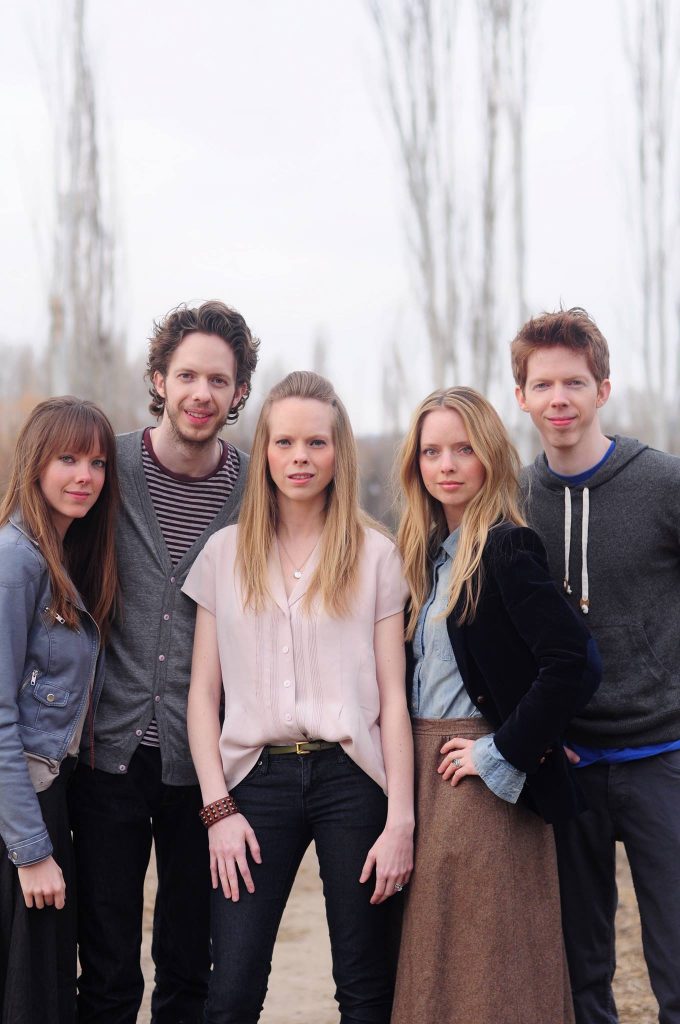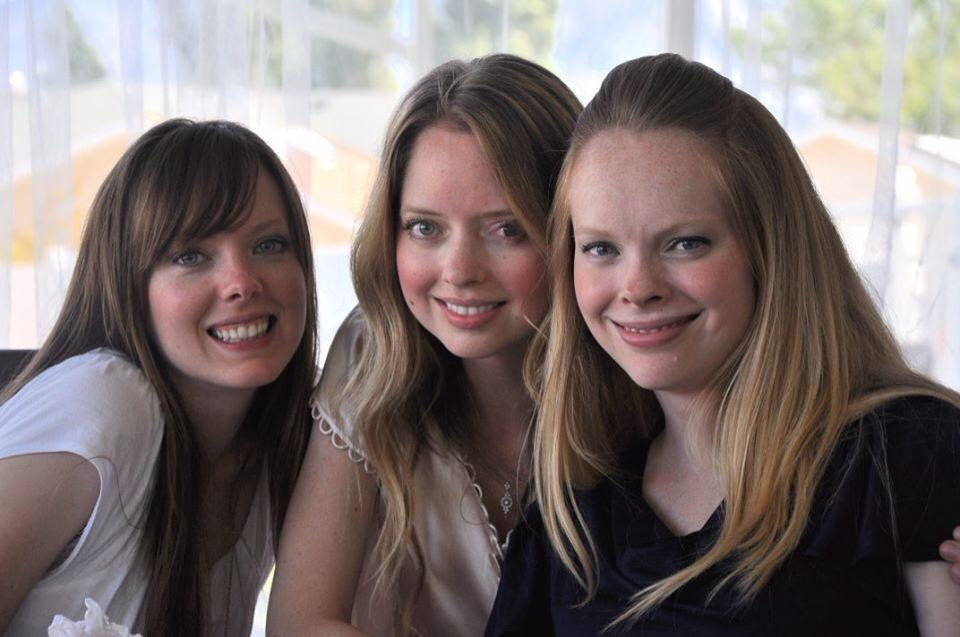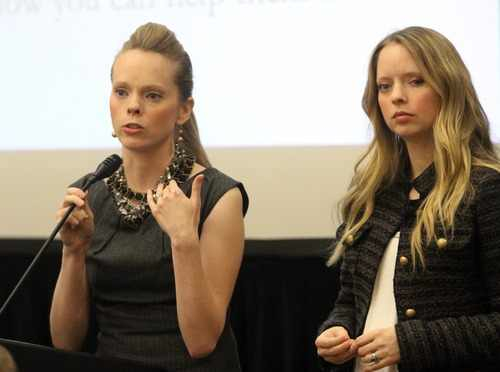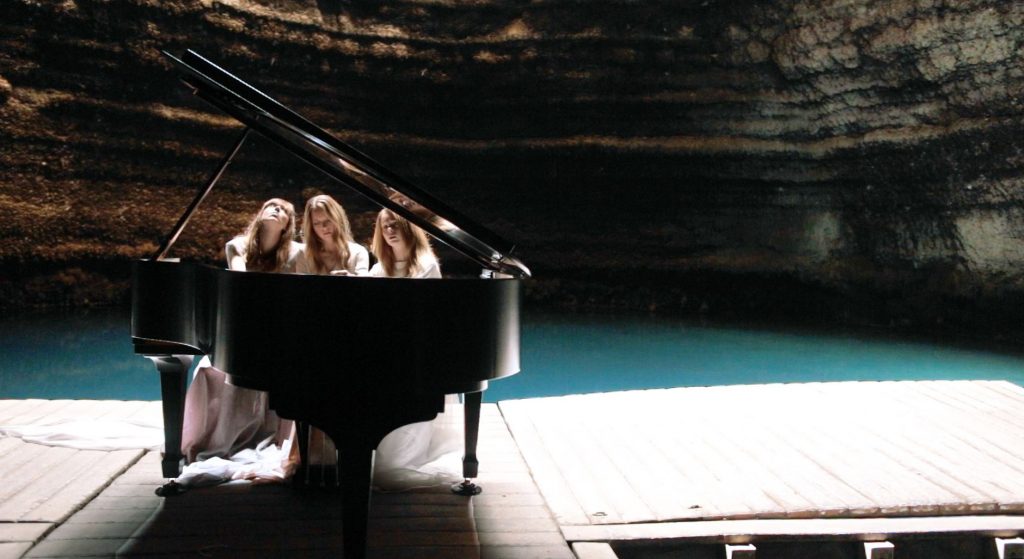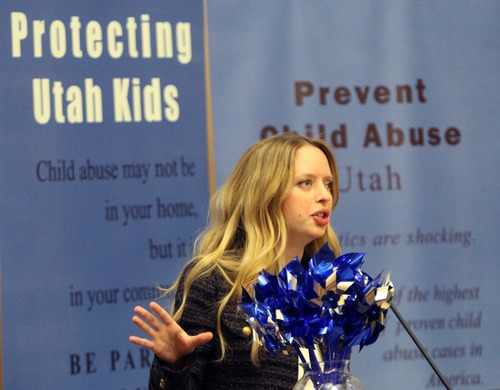Deondra, Desirae and Melody are three of the 5 Browns, a piano performing quintet composed of siblings. The sisters all attended The Juilliard School together and tour and perform with their brothers, gaining the highest accolades in the classical music world and performing in some of its finest venues. Three years ago, their father was sentenced to ten years in prison for sexual abuse involving the girls, and Deondra and Desirae founded the The Foundation for Survivors of Abuse, which focuses on changing the statute of limitation legislation across the country.
Would you tell me a little bit about your similarities and differences as sisters?
Desirae: Our similarities are that we’re all sisters, we’ve chosen music as our career, and we share the same family history–some of which was good, and some bad. As far as differences go, our personalities are very different. Even though I’m the oldest sister, Deondra often takes control of situations–she’s very organized and she directs us in our working situation. She deals mostly with our manager and will tell us where we need to be and when to be there and what to practice. Deondra is also a very good friend. She is a binding force for the five of us. She’s always reaching out, making calls, and checking in on how everybody’s doing. Melody, she’s very kind and thoughtful. Both Deondra and Melody are.
Deondra: Melody is always very thoughtful and always wants to make sure that everyone’s okay. She’s really kind to people and she tries very hard to check in with everyone. She’s a creative force behind a lot of projects that we do as a group, like music videos. She has a really great artistic eye. Desirae and I are only 14 months apart, so we are very close. We went to school together and I graduated early so we could go to Juilliard together. Desirae has a super easygoing personality; she’s very chill and doesn’t get stressed. People are really drawn to her because she’s so personable and outgoing and always has something interesting to say.
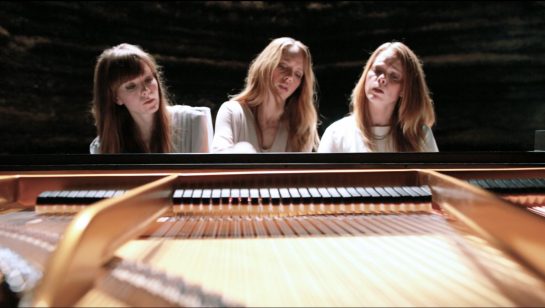
Melody: As far as similarities go, obviously we all look alike. The only difference is I’m the brunette and they’re the blondes. One thing that’s really cool about Deondra and Desirae is they’ve both been running the Foundation for Survivors of Abuse. Deondra is a force to be reckoned with. She’s the one who is making huge changes in the world, especially the U.S. That’s always been in her personality. She’s very fiery and is determined to get things done. Her drive has always helped us in our careers and it’s helping the Foundation move forward. Desirae is right behind her doing this with her. Desirae and Deondra are both mothers, but now that Desirae has two children, it’s so funny to me to see a side of Desirae that I’ve never seen before! She has to be more planned and organized, so her easygoing chill self now has a little more Deondra in there.
You all sound so lovely! It’s pretty remarkable that the five of you are all professional piano players. How did you all get started in piano?
Desirae: We started getting into piano because my mom was a singer and was involved in vocal performance. She found a piano teacher who taught children as young as three years old. Being the oldest in the family, I started playing the piano when I was three. I remember Deondra really wanted to come to my piano lessons and I told her that she’d have to wait until she was three. So when she turned three she started lessons and all down the line everybody started when they were three years old. I suppose the strange thing is that eventually everyone chose to make music their life. It wasn’t something that was necessarily expected; we each individually chose to make it our career.
At what point did you know that this was not just a hobby or a casual interest?
Deondra: When I reached my mid-to-late teenage years, I started to think more about what I wanted to do with my life–what college I wanted to attend. I think each of us in our teenage years realized this was something we really wanted to do, something we each wanted for ourselves. Each of us deciding that we wanted to go to a music school was the first big step. When we all attended Juilliard together, we had such great teachers and classmates. When it came time to graduate, management approached us and gave us the opportunity to perform and record albums together. It was one of those things that you always hope for, but it’s so difficult to break into the music business, and we were super excited that we were able to do it together. We just hit our 10th year of performing and touring together and it’s amazing that not only do I get to do this, but four of my best friends are there sharing these experiences with me.
That sounds amazing! As you mentioned, you all attended Juilliard together, did you all move to New York City at the same time?
Melody: Actually it was kind of gradual. When Desirae and Deondra reached college age, they decided to audition at different music schools around the country so that they could go off to college together. They decided on Juilliard and moved to New York City. They lived in the dorms while the rest of us were all in Utah, and they would call and tell us about the incredible training they were getting. One of their teachers headed up the pre-college division at Juilliard. Deondra and Desirae told us that we should really consider coming out and auditioning, so we went out and auditioned and we ended up getting in! At that point, my parents felt it was important enough to make the move across the country. So, the rest of us came a year later. We moved slightly upstate, about 45 minutes out of the city. Desirae and Deondra were still in the dorms and then eventually they moved upstate with us and moved home for a little bit.
Did you experience culture shock when you moved from Utah to New York City?
Desirae: A lot of people say that when you first come to New York City, you either love it or hate it. The first time I set foot in the city, I loved it. And I think my siblings share that feeling. It was so exciting to be somewhere where culture was at the forefront. The people there love theatre, dance, and music and I felt like I had found my people. In Utah I never really had that feeling. New York City was just such an exciting city. I loved the idea of being surrounded by people all the time. Something was always happening. After living in Utah and being homeschooled and spending many hours in a practice room, I found New York to be a really exciting change. Even today as I was contemplating this interview, I reflected that it was when I came to New York City that my life finally started.
Deondra: I felt like even though we were away from home and in a big city, I still found peace in the city. Juilliard is right across the street from the LDS church in Manhattan, which is now the temple. I also remember our singles ward being massive. So even though we were away from home, there was still a community of LDS people that made it so much easier at difficult points to be able to feel like I could find that inner peace amid a busy life.
Melody: When I first got there, I was about 13 years old. I remember it being slightly jarring that there wasn’t a lot of rural space. I was used to being outside with my brothers, riding our bikes and going up canyons. I remember one of the first days of living there, I was sitting outside on a patio and I was just thinking, “Oh my gosh, there’s really nowhere I can go where I can be alone!” There are so many people everywhere that it can be like a rat race. But on the flipside, when we entered the pre-college division at Juilliard, like Desirae, I felt like I had found my people. It was amazing to finally have true friends who understood what we were going through as musicians. Some of our friends were already touring so they could barely make it to school. We had all this commonality, like not being able to make it to homecoming dances and proms. I remember this one time one of my good friends could actually go to prom and she was so excited that she got to paint her nails! That was a big deal because none of us ever paint our fingernails because you can feel it while you play. Even though it was just for a night and she removed it the next day, she was so excited, and we all understood stuff like that.
As a group, you’ve had number one songs on the Classical Billboard Chart, you’ve toured around the world, and you’ve played with accomplished musicians and orchestras. What would each of you consider to be your career highlights?
Desirae: Last October, we had our Carnegie Hall debut as the 5 Browns. I can’t even explain what walking out onto the stage felt like. It was so overwhelmingly powerful. During our years at Juilliard we got season tickets to Carnegie Hall as a Christmas present. So as teenagers and while we were in college we would frequently go to hear our idols play at Carnegie Hall. To be able to walk out on that stage was incredible! The audience was so warm and their applause was so powerful. It felt like our performance was elevated by playing where so many legendary artists have performed before. That was definitely a career highlight for me.
Deondra: That’s exactly what I was going to say! I think another really great memory for me was four years ago when we played in China at the Beijing Grand National Theatre. It was a rare occasion on which we were each able to have our spouses join us on the trip. We went there just after the Beijing Olympics, so the city was still buzzing. It was amazing to be halfway across the world performing together and to see that the power of music transcends language barriers. Even though they couldn’t understand a word we were saying, it didn’t matter because we all shared a commonality, feeling the same emotions and having similar experiences. To realize the power of music and to relate to a different culture was pretty amazing.
Melody: For me, number one was playing at Carnegie Hall, like everyone said, because while growing up I always wanted to play there. Aside from that, there are a couple others. One was when we got to play on the Tonight Show. Right before they raised the curtain, when they announced the 5 Browns, I remember us sitting behind that curtain, just looking at each other like, Oh my gosh, we’re playing on the Tonight Show! This is the greatest thing! And then the curtain went up and it was our moment to play and it was just very electric. I remember that being a pretty big highlight as far as some of the media stuff we’ve done. As far as Church performances go, a big highlight was being asked to play at President Hinckley’s 90th-birthday celebration. It wasn’t even the playing that was such a highlight; the highlight came at the end, when they had all the artists who had performed hold hands and sing “The Spirit of God,” with the Mormon Tabernacle Choir singing behind us. Looking out into the audience, I remember seeing President Hinckley on the front row, many general authorities, and a huge audience. The spotlight was shining on us and I felt so moved. I started getting choked up because I was just so in the moment. I’ll always remember that experience.
Three years ago, your father was sentenced to ten years in prison for sexual abuse involving all of you. What made you break the silence after many years of abuse?
Deondra: One of our biggest goals has always been to make sure that we do everything in our power to protect other people from being hurt. When it came down to it, we realized that the risk was too big not to approach law enforcement about what had happened to us. We talked about it as sisters, and realized we didn’t want to be held responsible for potentially not saving someone’s childhood or life through our inability to come forward. We knew the risks– that it would likely go public and that there could be some fallout that we would have to deal with. However, we couldn’t live with ourselves knowing that we put other people at risk. It was a difficult decision, but we knew it was the right thing to do. One of the most amazing things is that we’ve been able to support each other. We have our amazing brothers, who have stood by us without even a second thought, and we have the support of each other as sisters. It’s hard enough to deal with things that have happened in your own life, but it’s almost worse to know that terrible things have happened to people that you love. I think to be able to know that we have each other’s backs no matter what is something that will be important for the rest of our lives.
Desirae: Our faith has really helped us cope and stay grounded; we’ve realized that our relationship with God is most important. For a long time we wanted to work things out privately as a family and through Church discipline, hoping that our father would own up to the things he had done. But eventually we felt it was important to go to law enforcement to protect other people. I feel like my faith was my guiding light during that time. I don’t know how people make these kinds of decisions without going to the Lord and petitioning Him for help.
How have you found healing?
Melody: Each of us has gone to the Lord with our questions, but we’ve also sought counseling. I believe the counseling aspect is very key because sometimes you can get direction and answers by going to a good counselor who can help you. Each of us has gone about finding healing differently. Both Desirae and Deondra find a lot of empowerment through their work with the Foundation for Survivors of Abuse. When they approached me about getting involved, I wasn’t so sure. At first I was going to go along with it just because I wanted to be there and I wanted to support the cause. But I realized that instead of empowering me, it brought me to a dark place over and over again. I realized, you know what, we’re different. We’re different people and we heal in different ways. For me, I just need time and distance from everything. The way I heal is through my art. I purge through my art. I also purge through nature–going out hiking and sailing with my husband. Being in a different area gets me away from the pain. Time is key. I feel much stronger than I did two or three years ago, but I believe more peace and healing will come as time goes on. I’m so grateful that my sisters were able to grant me the space and distance that I needed.
Deondra: Melody has a really good point. The road that Desirae and I have taken is not for everybody. Each person who has lived through terrible things like this has a different path. In some ways they may line up and in some they may be vastly different. Each is completely valid. It’s important to be understanding of different people’s personalities, experiences, and ways of life. Something that Desirae and I have realized from traveling across the country and speaking with various victims is that although prosecuting can lead to wonderful things, it is not necessarily going to be the answer for everybody. It takes a big toll on your emotions. In the U.S. one in four girls and one in six boys are sexually abused before their their 18th birthday, so whether you realize it or not, we all know someone who has lived through it. The type of understanding and compassion that Melody was talking about is what we need to extend to everyone around us. Until you walk a day in their shoes, you never know what is really going on in homes and behind closed doors. It’s important to show compassion and love to everybody.
Tell me more about your faith and the role that Mormonism played in your life all these years.
Desirae: For me personally, and I think for other abuse survivors who have grown up in the Church, it can be difficult to separate the gospel from imperfect and sometimes dangerous people within the Church. I needed to separate the Mormonism that I grew up with, in the household of an abuser, from what I felt was the true gospel. I feel like I was converted as an adult even though I was baptized as an eight-year-old. My personal conversion has been life changing. It’s been a source of comfort for me when we were prosecuting and going through family upheaval. To other abuse survivors I would just like to offer hope by saying that even if your abuser is in the Mormon community, the gospel itself is still true. The Book of Mormon is still true. And the Savior’s healing is real. The Atonement is real. It is possible to separate those beliefs from whatever abuse has happened.
Melody: It wasn’t until I was attending college that I really started to think about my faith. I remember sitting at a cafeteria table with a lot of my friends who were pursuing different mediums–music, dance, drama–and they started asking about Mormonism. There was this one drama student who was like, “So you’re telling me that you believe this guy found these gold plates and there were people that came over in barges to the Americas from Israel?” It was the first time that it clicked in my head that, wow, this really is a crazy story! I had grown up with it and I had been surrounded by people who also believed it. Even though I was answering his questions, I just started to really think, wow, do I actually believe this? I think that so many youth in the Church have to go through a similar experience when they realize, wait a minute, I’ve grown up with this, but do I actually believe this?
For me, I had to take a little break from the Church. I didn’t compromise any of my standards, but I stepped away from the Church while I tried to figure out what I really believed. When I came back, I started to realize all the things I was missing. For instance, when I stepped away from the Church I would use Sunday to practice and prepare for Monday lessons and it seemed like my week never ended. I felt my weeks getting darker and darker until finally I was like, I can’t do this anymore! I had lost that light that was so important in my youth. I had to go through this experience of separation and trying to figure out what I believed, starting at the very beginning–do I believe in God, do I believe in a Savior, do I believe in Joseph Smith and what he saw? Gradually, my testimony started coming back. It’s taken years, but I was so glad that I went through that experience before I hit this really traumatic time in my life with my family. If I hadn’t experienced that beforehand, it would have been really hard to ask the difficult questions when I was already going through a very traumatic, horrific experience. By the time we were pursuing litigation with my father and digging up those painful memories, I felt like my testimony was very strong, so I was able to draw upon deep wells of spirituality. Although I questioned why these things happened to me, in the end, I knew the gospel was true and I was able to hold on to that anchor. It really got me through that huge dark part of my life.
Thanks for sharing. I’ve become aware of a few women in my own ward who are also victims of abuse. What advice do you have for those of us who haven’t experienced abuse, but who may know someone who has? How can we minister to them?
Deondra: I’ve had several close friends–some who were even friends while the abuse was happening–who didn’t know. Usually, nobody knows when abuse is happening. My friends have since approached me and asked, “What can I do? Have I said anything that’s made it more difficult?” I think the biggest thing is to just keep doing what you’re doing. Be a listening ear, reach out to people and let them know that you really care. You don’t have to have the perfect thing to say, because nobody really knows what to say. Most of us aren’t professionals who deal with this every day. But, just be a friend. There will be days when your friend wants to talk about it, when it feels helpful to talk things through. And there will be other days when your friend doesn’t want to think about it or talk about it at all, and that’s okay. I’ve realized that the people close to me in my life can see where I’m at any given day. I’ll bring it up if I’m interested in talking about it, and if I’m not then I won’t. One of the most important things is to just love people unconditionally and realize there are going to be days when they don’t know what they feel, and other days when they’re in the midst of a lot of trauma inside their head. Just be there and show support and love.
Desirae: Regarding the Church environment, there’s a great talk by Chieko Okazaki, titled “Healing From Sexual Abuse.” She talks about how we should all assume that in every Relief Society class, in every Primary class, and in every sacrament meeting, there are people currently going through abuse, people who have been abused, and people who will be abused, so we should keep that in mind as we’re teaching lessons about chastity or forgiveness. It’s better to be educated about these things rather than go into a situation and maybe say something that could hurt people. I think her talk pinpoints how to be aware of those individuals in the Church and how to help them. Even if you don’t know who they are or even if they don’t approach you about it, keep them in mind as you’re speaking to the collective.
Melody: Always remember that there are so many silent sufferers in your meetings who don’t speak up about what has happened to them. It’s not always obvious who those people are; they don’t wear it on their sleeve. In Relief Society, a lot of people share comments about the hardships they’ve gone through, but remember there are many more people in the room going through hard things who don’t say anything. I always think about them and how a lesson might relate to them whenever I teach Relief Society or when I’m giving a talk.
Desirae and Deondra, you’ve started the Foundation for Survivors of Abuse. That’s pretty amazing. Can you tell us more about it?
Deondra: When our sexual abuse went public, it was very overwhelming. We started to receive emails from people reaching out to us and telling us their own stories, and we realized that there was a big problem in the United States, in particular with statute of limitation laws for sexual abuse crimes. Depending on what state you live in, the opportunity to come forward and press charges against a perpetrator can expire before a victim is ready to come forward. The average time is at least 15 or 16 years before victims will come forward after their abuse. It often takes decades to feel confident and secure before you can start looking at the memories that you’ve cast aside in a dark closet somewhere. After receiving all these emails we started to realize how blessed we were to be living in a state where the laws had changed so we could prosecute our father over 15 years after the abuse had happened. We researched various charities and realized there was no other foundation that supported what we wanted to do, which was change statute of limitation legislation across the country. Desirae and I talked to each other, and as overwhelming as it seemed to start a foundation, it felt like it was the right thing to do. It’s been amazing to talk with legislators both on national and state levels and share our stories of not only what we’ve lived through, but how we were able to prosecute over 15 years after the abuse. Telling them how many millions of people don’t have that opportunity is heartbreaking. Seeing the response that we’ve had so far has been overwhelming. I look at my almost four-year-old daughter, and I think, hopefully, it’s a safer place for her when she grows up. We do this for little kids so that they can grow up in a world where if something terrible like this did happen, at least they and other victims would know they are protected by the law in their state and country. Unfortunately, too many people have these terrible crimes in common and it’s difficult for us when we see how many people have been hurt similarly to us. I’ve felt this overwhelming sense of community and compassion from strangers because we have all lived through terrible things. We’re all standing by supporting each other in whatever way we can to help lead change.
You’ve all come a long way, both in your personal and professional lives. How do your spouses support you?
Desirae: Our spouses knew what they were getting into, marrying professional musicians. My husband is also a professional musician–he’s a concert violinist–so we definitely understand each other and support each other. That understanding and support is what we bought into when we got married. Now that I have two kids, life is more complicated but so much more wonderful. We just have to schedule things out and look further in advance and plan for things, but life is so full. One of our Juilliard teachers explained to us that most classical-performing touring musicians don’t have rich family lives, just to make sure that we knew what we were getting into. Because of this, the five of us have made very conscious decisions to limit our schedules and how long we are gone on tour, and to not perform on Sundays. Our management wasn’t super thrilled to hear this, but nonetheless has helped us schedule in such a way that we can have a family life. It’s tricky but not impossible. Our families and our relationships with each other as siblings always come first. We always check in with each other to make sure everybody’s happy, and if they’re not we see what adjustments can be made, because if everybody’s happy then we can continue to play together.
Can you each give us an idea of what a typical week looks like for you?
Deondra: I wear a different hat depending on what hour of the day it is. My daughter is now four, so I work around her preschool schedule. I also make time to teach piano lessons most afternoons because I love it. Additionally, I have my own practicing to do and I have to keep up with the many tasks of running the Foundation. A typical week for me is going from spending time on my computer–trying to catch up on emails both for the 5 browns and the Foundation–to jumping back and forth on the piano, whether practicing on my own or teaching. My daughter has a very keen sense of when I have not spent enough time with her and she’ll come and tell me it’s time for her now. I try as much as I can to make time for her. She loves to read so we read and color a lot. She’s been such a wonderful source of happiness for my husband and me. Sometimes I get super overwhelmed–I tend to get a little more stressed out–so I have to learn to balance life as much as I can and accept that I can’t do everything. I have very full days, but full of such wonderful things. The gratification I receive from the work that the Foundation is doing makes it so worth the effort and the stress and the emotional toll it can take. The wonderful things that we get from performing together, like seeing children light up when they hear classical music, are also very gratifying. To be able to teach young children piano, to see that look in their eye when they really get something, when you’re watching them fall in love with classical music, is so invigorating. And when my husband looks at me and tells me that I have his support and that he’s proud to stand beside me in all of my projects and endeavors it means more than anything else really could.
Melody: Number one in my week is practicing the piano. Some days I practice for two hours, which is not that much, and some days when it gets really intense I can practice anywhere from four to eight hours. It’s just a matter of keeping up with our regular demands and what’s coming up on the touring and album schedule. If we have an album coming up I do hardcore practicing every day and we spend every waking moment trying to rehearse together, and that definitely takes priority. Right now things are slightly lighter, even though we’re getting ready for another tour with new music and practicing is important. Then number two, I am the techy one of the group, so I manage the website and everything that has to do with our online presence. In the first few years we performed, our record label was really getting us out there in the video realm and investing a lot of money in us, but those days of record labels taking on all of that are over. Artists now have to put these things together on their own. I’m the creative director in the group, so right now I’m immersed in putting footage together for our music videos. All of my time right now outside of practicing is going toward all of the techy stuff, which is pretty hardcore right now. On top of all that, obviously my time with my husband is very important and valuable so we try to make as much time for each other as possible. I’m the techy one in our relationship, too, because he has his own business and I help him with websites, etc. My life outside of the keyboard seems to be at a different keyboard with a screen!
Desirae: I have a one-year-old and also a five-month-old, so I’ve been adjusting to life with two tiny ones. I don’t even set my alarm anymore because I know when they are going to wake me up. My husband and I are both musicians, so when we’re not performing we work from home. I try to squeeze in practicing between feedings, going to the park, playing, and keeping my children clean and healthy. I tend to practice in 30-minute-to-one-hour segments and I try to get four to eight of those in in a day, depending on the upcoming deadline. I also check in with Deondra through emails and conference calls for the Foundation and for the 5 Browns. When you’re young and wanting to be a pianist, you don’t realize that you’ll be running a business. It’s one of the things they don’t teach you at music school. That part does take time, although I am not as involved to the degree that Deondra and Melody are. Right now, Deondra and Melody do a lot more running of the 5 Browns than I do. They’ve allowed me some time to make adjustments with being postpartum and having two kids. In that way, it’s nice to work with family. They’ve all been very supportive of having babies and trying to make adjustments in our work schedule. When we’re on tour, it’s a totally different schedule. On tour we travel every day to a different city, staying in hotels. We wake up late, eat a late lunch/breakfast, go to a soundcheck, go back for a nap, then eat dinner and play the concert and then do it again in a couple days. Actually, when we’re on tour in many ways it’s much more streamlined and simple than when we’re at home.
Deondra: I agree. Except the difference for Desirae and me is that as moms we have to switch to being alert and awake at night time, which is difficult for me! When I’m at home during the regular day I’m exhausted by eight or nine o’clock at night. On tour, that’s right in the middle of when we’re supposed to be at our peak. Depending upon which week out of the month it is, I’m supposed to go from waking up early with a child to having to stay awake late.
Thank you so much to all of you for giving us some insight into your lives! Is there anything else you’d like to add?
Desirae: I want to reiterate that our priorities are our relationship with God, our relationship with our families, and our relationship to music, in that order. It’s nice to know that we work with people who understand and support that. I’m so grateful for the blessings that the Church and the gospel have brought into my life. My husband and I have a very old old friend, he’s like 90 something, and my husband asked him once, “Do you think it’s all [Mormonism] true?” And he said, “You know, I don’t know, but it has brought me a really happy life, so if I die and it’s not true, well, I lived a really happy life.” I don’t know if I totally agree with that, but the Church does bring so much happiness. It’s nice as classical musicians to have such grounding in our lives, with our kids and our spouses sharing those values. That’s been a huge blessing.
Deondra: Now that my daughter is a Sunbeam, I’m starting to see the gospel through her eyes. I see how excited she is to go to church every week. Even if I’m sick and in bed, she still remembers it’s Sunday and that it’s time to go to church. When she comes home she is so excited to talk about the lessons she learned about Jesus. I get to see the gospel through her eyes and I see how much it adds to our family and the good that comes from it. Hearing her say her sweet little prayers–so simple and pure–is one of the biggest highlights of my day. Having that in our home is a big blessing in my life.
At A Glance
The 3 Brown Sisters
 Name: Deondra Brown
Name: Deondra Brown
Location: Salt Lake City, UT
Age: 34
Marital status: married (11 years and counting)
Children: A 4 year old
Occupation: member of The 5 Browns, President of the Foundation for Survivors of Abuse (FSA), piano teacher
Schools Attended: The Juilliard School
Favorite Hymn: “Abide With Me: ‘Tis Eventide”
On The Web: www.the5browns.com and www.survivingabuse.org
Name: Desirae Brown
Location: New York, NY
Age: 35
Marital status: Married for 12 years to Bryan Hernandez-Luch, violinist
Children: 2 children. Poppy, 2 years and Rowan, 8 months
Occupation: Pianist with The 5 Browns and Vice President, The Foundation for Survivors of Abuse
Schools Attended: The Juilliard School, BM 2001, MM 2003
Favorite Hymn: “Be Still My Soul”
On The Web: www.the5browns.com and www.survivingabuse.org
Name: Melody Brown
Location: Salt Lake City, UT
Age: 30
Marital status: Married since 2007
Children: none
Occupation: Pianist with The 5 Browns
Schools Attended: The Juilliard School
Favorite Hymn: “If You Could Hie To Kolob”
On The Web: www.the5browns.com and ThreadEthic.com
Interview by Linda Yamamoto. Photos used with permission.
At A Glance

